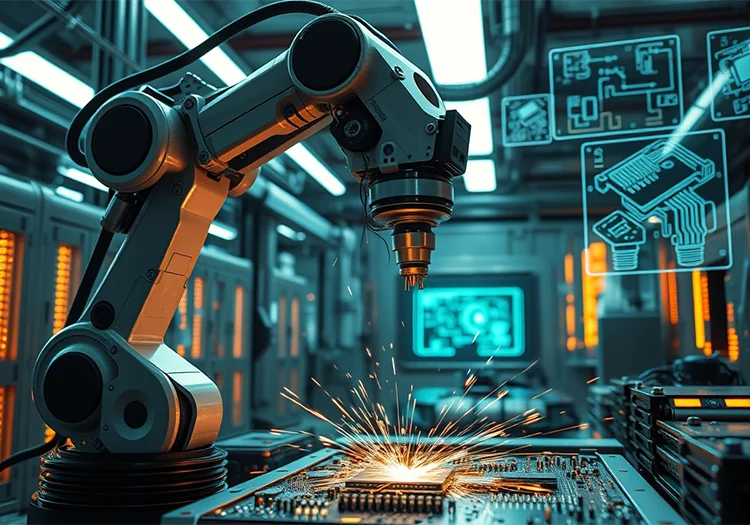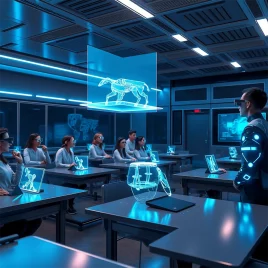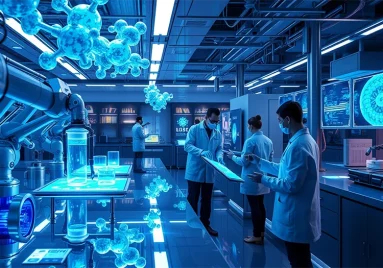AI automation is reshaping industries worldwide by improving efficiency, reducing costs, and enhancing productivity. From manufacturing to healthcare, AI-driven solutions are streamlining operations and making businesses more competitive. But what does the future hold for AI automation? Let’s dive in!
What is AI Automation?
AI automation refers to the integration of artificial intelligence into various industrial processes to perform tasks without human intervention. Unlike traditional automation, which follows predefined rules, AI automation uses machine learning and deep learning to adapt and improve over time.
The Evolution of AI in Industries
Initially, automation relied on mechanical and electrical systems. With the advent of AI, industries have seen a shift towards intelligent systems capable of learning and making decisions. Today, AI is revolutionizing every sector, making operations smarter and more efficient.
Key Industries Benefiting from AI Automation
Manufacturing
AI-powered robots handle assembly lines, predictive maintenance prevents equipment failures, and quality control is enhanced through computer vision.
Healthcare
AI-driven diagnostics, robotic surgeries, and personalized treatments are improving patient care and operational efficiency.
Retail
AI personalizes customer experiences, manages inventory, and optimizes pricing strategies.
Finance
Banks and financial institutions use AI for fraud detection, risk assessment, and algorithmic trading.
Logistics
AI streamlines supply chains, optimizes delivery routes, and even enables autonomous vehicles for transportation.
How AI Automation Enhances Productivity
AI handles repetitive tasks, reducing human workload and increasing efficiency. Businesses that integrate AI see improved accuracy, better decision-making, and cost savings.
AI-Powered Smart Factories
The integration of IoT with AI enables smart factories where machines communicate, self-monitor, and optimize production in real time.
Challenges of AI Automation
Despite its advantages, AI automation comes with challenges like job displacement, high initial costs, and ethical concerns regarding privacy and bias.
The Role of Machine Learning and Deep Learning
AI systems continuously learn and adapt using machine learning and deep learning techniques, allowing for smarter decision-making and process improvements.
AI in Workforce Management
AI is revolutionizing HR by automating recruitment, tracking employee performance, and optimizing workforce planning.
The Future of AI Automation in Industries
Emerging trends like AI-driven decision-making, hyper-automation, and autonomous systems will continue shaping industries in the coming years.
How Businesses Can Adapt to AI Automation
To stay competitive, businesses must invest in AI solutions, train employees, and adapt to technological advancements.
Ethical Considerations in AI Automation
AI bias, privacy concerns, and transparency are critical ethical issues that businesses and governments need to address.
AI and Cybersecurity in Industries
AI enhances cybersecurity by detecting and preventing cyber threats before they cause harm.
Government Regulations and AI Automation
Governments worldwide are implementing policies to ensure responsible AI use while promoting innovation.
Conclusion
AI automation is the future of industry, offering endless possibilities to improve efficiency, reduce costs, and enhance productivity. However, businesses must adapt to these changes by investing in AI solutions and addressing ethical concerns. The future is automated—are you ready?
FAQs
- What are the benefits of AI automation in industries?
- AI improves efficiency, reduces costs, enhances accuracy, and streamlines operations.
- Will AI automation replace human jobs?
- While AI may replace some jobs, it will also create new opportunities requiring advanced skills.
- How can small businesses implement AI automation?
- Small businesses can start with AI-powered chatbots, CRM systems, and data analytics tools.
- What industries will AI impact the most in the future?
- Manufacturing, healthcare, finance, retail, and logistics will see the most AI-driven transformations.
- Is AI automation expensive to implement?
- Initial costs can be high, but long-term benefits outweigh the investment through increased efficiency and reduced operational costs.
Please don’t forget to leave a review.






